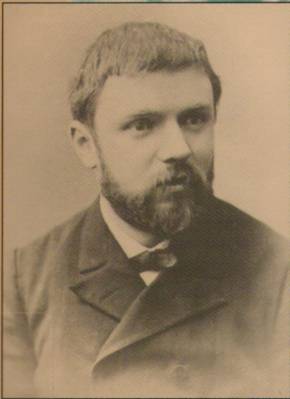Henri Poincaré
Henri Poincaré (1854-1912) was a French "mathematician, geometer, philosopher, and man of letters, who was a kind of poet of the infinite, a kind of bard of science."[1] Today he is best known for being one of the first to propose the special theory of relativity. Due to a childhood illness (diphtheria), he was originally taught at home by his mother.[2]
When Poincaré later enrolled in school, he was a brilliant student, excelling in nearly every subject in the Lycée (now renamed after him) and winning first prizes in a competition among the top students from all the Lycées across France. He did not learn by rote memorization, however, but by linking ideas in a visual manner, an approach attributed to his poor eyesight that prevented him from seeing what was on the blackboard. He received a doctoral degree in mathematics based on a thesis in differential mathematics that some of his reviewers criticized. He then taught in a university, where he also had critics of his disorganized style, but in 1886 gained an appointment to a prestigious chair of mathematical physics and probability at the Sorbonne. He taught there until his death at age 58.
Poincaré invented algebraic topology, and for 40 years afterwards virtually all work in this field were based on six papers written by him in the late 1890s. He proposed the Poincaré conjecture in 1904 and it remained unproven until 2003.[3]
Poincaré had a major contribution to number theory in 1901 in connection with the Diophantine problem of finding the points with rational coordinates on a curve ƒ(x, y) = 0, such that the coefficients of ƒ are rational numbers.
Poincaré was an originator of the special theory of relativity,[4] using ideas of Hendrik Lorentz and prior to Albert Einstein. Poincaré gave a lecture on his special theory of relativity at the 1904 World's Fair in St. Louis, a year before Einstein published his paper on the same theory. Poincaré published additional papers on his theory in 1905, prior to the publication of Einstein's paper.
Poincaré contributed to the understanding of the difficult three-body problem in celestial physics. He demonstrated that series expansions previously used in studying the 3-body problem were convergent, but not generally uniformly. This added skepticism to the stability proofs of Lagrange and Laplace.
Sources:
- ↑ This quote is from his funeral. See http://www-groups.dcs.st-and.ac.uk/~history/Biographies/Poincare.html
- ↑ http://www-gap.dcs.st-and.ac.uk/~history/Biographies/Poincare.html
- ↑ http://mathworld.wolfram.com/PoincareConjecture.html
- ↑ Poincaré, Henri (1902). La science et l'hypothèse (Paris: E. Flamarion). English translation
